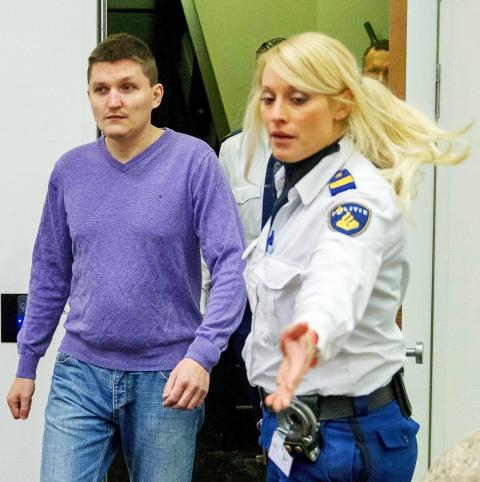A Russian citizen pleaded not guilty on Tuesday to an 11-count indictment charging him and four others with running what authorities have called the largest criminal computer hacking scheme ever prosecuted in the US.
Vladimir Drinkman appeared in US District Court in New Jersey shackled and in yellow prison garb for the brief hearing, in which he pleaded not guilty to computer hacking conspiracy, wire fraud conspiracy, several counts of unauthorized computer access and three counts of wire fraud.
The wire fraud and wire fraud conspiracy counts each carries a maximum sentence of 30 years.

Photo: EPA
Authorities say Drinkman, 34, of Moscow and Syktyvkar, Russia, and four co-conspirators from Russia and Ukraine stole and sold 100 million to 200 million credit and debit card numbers from payment processing companies, retailers and financial institutions between 2005 and 2012. The US attorney’s office estimated the total loss to just three of the corporate victims comes to more than US$300 million.
Among the alleged victims were the NASDAQ stock exchange; Dow Jones Inc; Heartland Payment Systems; JC Penney; 7-Eleven and JetBlue Airways.
Heartland, which has offices in Princeton and is one of the world’s largest credit and debit card payment processing companies, suffered the loss of more than 130 million card numbers leading to losses of about US$200 million, according to the indictment. The co-conspirators allegedly stole more than 950,000 card numbers from Atlanta, Georgia-based Global Payment Systems, one of the world’s largest electronic transaction processing companies, creating losses of about US$93 million.
According to the US attorney’s office, Drinkman and others would seek vulnerabilities in the networks of corporations that conducted financial transactions and then used computers in New Jersey, California, Illinois and Pennsylvania in the US as well as countries including the Netherlands, the Bahamas, Latvia and Panama to stage attacks on the networks.
US federal prosecutors say that once login data, card numbers and personal information was stolen it was passed to Dmitriy Smilianets, who allegedly sold it to resellers who in turn sold it to individuals to be encoded onto the magnetic strips of blank plastic cards. The cards were used to withdraw money from ATMs or charge purchases.
According to the indictment, Smilianets charged about US$10 for each stolen US credit card number, US$15 for a Canadian number and US$50 for each European credit card number, with discounts for bulk purchases.
Drinkman was held in Amsterdam after his arrest in 2012 before he was extradited on Friday, according to his attorney.
Smilianets is also in custody awaiting trial. The other three named in the indictment are fugitives.

To many, Tatu City on the outskirts of Nairobi looks like a success. The first city entirely built by a private company to be operational in east Africa, with about 25,000 people living and working there, it accounts for about two-thirds of all foreign investment in Kenya. Its low-tax status has attracted more than 100 businesses including Heineken, coffee brand Dormans, and the biggest call-center and cold-chain transport firms in the region. However, to some local politicians, Tatu City has looked more like a target for extortion. A parade of governors have demanded land worth millions of dollars in exchange

Hong Kong authorities ramped up sales of the local dollar as the greenback’s slide threatened the foreign-exchange peg. The Hong Kong Monetary Authority (HKMA) sold a record HK$60.5 billion (US$7.8 billion) of the city’s currency, according to an alert sent on its Bloomberg page yesterday in Asia, after it tested the upper end of its trading band. That added to the HK$56.1 billion of sales versus the greenback since Friday. The rapid intervention signals efforts from the city’s authorities to limit the local currency’s moves within its HK$7.75 to HK$7.85 per US dollar trading band. Heavy sales of the local dollar by

Taiwan Semiconductor Manufacturing Co’s (TSMC, 台積電) revenue jumped 48 percent last month, underscoring how electronics firms scrambled to acquire essential components before global tariffs took effect. The main chipmaker for Apple Inc and Nvidia Corp reported monthly sales of NT$349.6 billion (US$11.6 billion). That compares with the average analysts’ estimate for a 38 percent rise in second-quarter revenue. US President Donald Trump’s trade war is prompting economists to retool GDP forecasts worldwide, casting doubt over the outlook for everything from iPhone demand to computing and datacenter construction. However, TSMC — a barometer for global tech spending given its central role in the

An Indonesian animated movie is smashing regional box office records and could be set for wider success as it prepares to open beyond the Southeast Asian archipelago’s silver screens. Jumbo — a film based on the adventures of main character, Don, a large orphaned Indonesian boy facing bullying at school — last month became the highest-grossing Southeast Asian animated film, raking in more than US$8 million. Released at the end of March to coincide with the Eid holidays after the Islamic fasting month of Ramadan, the movie has hit 8 million ticket sales, the third-highest in Indonesian cinema history, Film